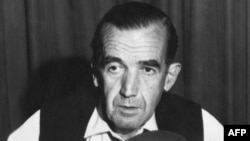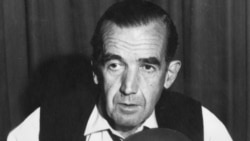Edward R. Murrow was a renowned 20th century American broadcaster known for his insistence on truth-telling in journalism. Each year the U.S. State Department’s Edward R. Murrow Program for Journalists, which is conducted in partnership with several top U.S. journalism schools, brings more than 100 emerging leaders in journalism from around the world to study U.S. journalistic practices and engage in a dialogue with their U.S. counterparts.
Secretary of State John Kerry recently addressed the participants in this year’s program, noting that the founders of our country, in the Constitution, “gave protection to only one business, only one vocation. It was journalism. In the First Amendment,” he said, “they decided that freedom of the press had to be sanctified, in essence.”
He told the participants that they were the connection in their countries “to vast numbers of people and the information they get, what they learn about the world, what they shape as their own views and beliefs…A free and open press,” Mr. Kerry noted, “is a vital foundation of peace and prosperity.”
Asked by a program participant whether “democracy is a universal concept,” Secretary Kerry said he believed “the values underneath democracy are a universal set of principles and values – freedom, freedom of choice, respect for human rights, people being able to choose their future…In many places, you have no freedom to be able to speak out about what’s happening politically without winding up in jail, or is some cases being dead. We believe that it’s in democracies where those rights are protected, where there’s universal accountability of all people.”
Secretary of State Kerry emphasized that democracy can take a variety of forms – parliamentarian or republican, for example -- but, he said, “it is only in democracies that the full measure of universal rights and aspirations, I believe, are given full life. . .So while you can argue about the governance structure, you cannot argue, I think, about the rights that are the foundations on which [the structure] is built.”
Secretary Kerry noted that fundamental rights “are the things that bind people together, particularly in this new world that is so interconnected.”
In terms of accountability for seeing those rights are upheld, he said, “There’s a new policeman on the block; it’s all of you…We’re living in a new world of accountability, and I think because of that, people are increasingly going to demand those universal rights.”
Secretary of State John Kerry recently addressed the participants in this year’s program, noting that the founders of our country, in the Constitution, “gave protection to only one business, only one vocation. It was journalism. In the First Amendment,” he said, “they decided that freedom of the press had to be sanctified, in essence.”
He told the participants that they were the connection in their countries “to vast numbers of people and the information they get, what they learn about the world, what they shape as their own views and beliefs…A free and open press,” Mr. Kerry noted, “is a vital foundation of peace and prosperity.”
Asked by a program participant whether “democracy is a universal concept,” Secretary Kerry said he believed “the values underneath democracy are a universal set of principles and values – freedom, freedom of choice, respect for human rights, people being able to choose their future…In many places, you have no freedom to be able to speak out about what’s happening politically without winding up in jail, or is some cases being dead. We believe that it’s in democracies where those rights are protected, where there’s universal accountability of all people.”
Secretary of State Kerry emphasized that democracy can take a variety of forms – parliamentarian or republican, for example -- but, he said, “it is only in democracies that the full measure of universal rights and aspirations, I believe, are given full life. . .So while you can argue about the governance structure, you cannot argue, I think, about the rights that are the foundations on which [the structure] is built.”
Secretary Kerry noted that fundamental rights “are the things that bind people together, particularly in this new world that is so interconnected.”
In terms of accountability for seeing those rights are upheld, he said, “There’s a new policeman on the block; it’s all of you…We’re living in a new world of accountability, and I think because of that, people are increasingly going to demand those universal rights.”


















